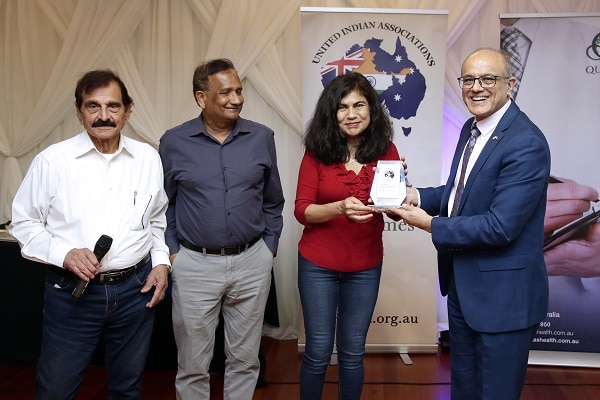Latest news
Read the latest news from the Centre for Sustainable Materials Research and Technology

On International Women's Day 9 March 2022, Veena delivered a keynote address to Sydney’s United Indian Associations Inc, in a TEDx-like talk about her pioneering work in sustainability.
Read the full IndianLink News story
Excerpt:
March 17, 2022
“True empowerment comes when you lift others up.” This was the simple yet profound message that Prof. Veena Sahajwalla, NSW Australian of the Year, brought to a recent Women’s Day gathering.
Organised by Sydney’s United Indian Associations Inc, the event saw the much-celebrated scientist, inventor, science communicator and flagbearer of women in STEM, present a TEDx-like talk about her pioneering work in sustainability.
The overarching theme in her address was to ‘pay it forward’.
“If privileged people have inspired you, then use that experience to lift others up,” she said. “Pay it forward. This is real empowerment – not only for them but ultimately for you as well.”
Her well-known story began at IIT Kanpur, where she was the only girl in her metallurgy class. She was already breaking biases. This may have become force of habit now for Prof. Sahajwalla, but she admits it wasn’t always like that.
She recounted, at the UIA Women’s Day event, being perpetually ready to sneak out of a backdoor, until a well-regarded teacher singled her out for public acclaim.
It is an experience she will never forget, and one that empowered her to push open giant doors for herself.
Today, her work in transforming waste products into steel, ceramics and asphalt is awe-inspiring, and she is credited with new terminology like ‘green steel’ and ‘green ceramics’.
In her talk she detailed the process of how waste must be viewed as a valuable resource, reimagined into new life in what she calls ‘microfactories’.
The technology behind it aside, Prof. Sahajwalla’s main thrust is to raise the quality of people’s life.
“I see my work not just as science and engineering, but as wider social reform.”
An example of such reform is Andrew from Cootamundra, who set up a microfactory with Prof. Sahajwalla’s help. “He went from being a collector of waste to a manufacturer – he’s now converting discarded tyres, mattresses and glass, into tiles, furniture, roads and playgrounds. And that’s why I’m keen to include a fourth R, Reform, to the three Rs in sustainability – Reduce, Reuse, Recycle.”
An impressed Julia Finn, NSW MP for Granville, noted in her own address, “I’m not surprised… that multicultural communities are doing a better job in the representation of women. These are the other biases we need to break.”

Julia Finn MP
Understanding of Prof. Sahajwalla’s early hesitations, Ms Finn lamented that women don’t often celebrate themselves and are a ‘bit bashful’ about their own successes. “We must be proud of our achievements, and of the hard work that went into them.”
She acknowledged the hard work that women in general have undertaken during the pandemic. “We have borne the brunt of job losses in retail and hospitality. We shouldered more of the burden in frontline work at hospitals and schools. We took the fire in homeschooling challenges, and in caring for children and elderly parents. It’s been far more challenging for women. It has helped us understand how important women’s work is, and how undervalued it is.”
Women’s work during the pandemic also came in for special attention by Dr Sunil Vyas, President of the UIA. “Women innovators led from the front in the development of COVID vaccines, such as Dr Ozlem Tureci (founder of BioNTeach) and Prof. Sarah Gilbert (of Astra Zeneca fame). Local health specialists such as Dr Kerry Chant, Prof. Jeanette Ward and Prof. Catherine Bennett became household names as they kept us uptodate on COVID trends and the government’s health advisory.”

Dr Sunil Vyas, UIA President, with (from right) Dave Passi, Dr Rama Mahapatra and Prof. Veena Sahajwalla
Nonetheless, Dr Vyas pointed out, there are many more strides to be made in women’s empowerment. “Perhaps some of these should come from the men themselves. There’s still a long way to go in achieving pay parity, and eliminating domestic violence. Men must call out such discriminatory behaviour; we must hold ourselves to better standards.”
His sentiment was echoed by Dr Hari Harinath in his address. The Chair of Multicultural NSW urged the audience to stand up and take the stance to #BreakTheBias by crossing their arms at their chest.